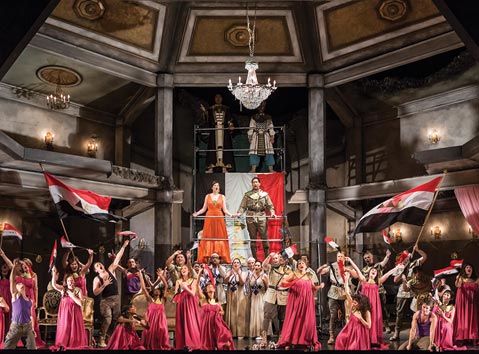Aida at the Granada Theatre
Opera Santa Barbara Brings This Classic into the 21st Century

“Fear me now, slave!” sings Amneris, princess of Egypt. “Let your heart break — this love will mean your death.” Poor Aida. She has stumbled upon the ultimate rival in her pursuit of true love with the Egyptian officer Radamès, as the woman who commands her is also in love with him. But the wrath of Amneris, though potent, will be the least of Aida’s troubles before this night is over, even though the prediction that Aida’s love will mean her death does eventually come true.
In this musically satisfying and dramatically different production of Aida, another meaning is layered onto the tragic confluence of love and death. Aida, wonderfully sung and acted by Michelle Johnson, suffers not only from the inner demons of human nature and the familiar sorrows of jealous love, but also as a function of being caught in a specific moment in history. This observation — that the tragedy of opera can sometimes coincide with the tragedy of life — is what justifies the outrageousness, and to some extent hit-and-miss quality, of the very unusual contemporary staging that director Francesca Zambello has developed. By going all the way and following through with a fully loaded update, this Aida touched absurdity at times but nevertheless cracked the seal separating the stage of grand opera and the streets of contemporary Egypt.
If the opera in question had been anything but Aida, Zambello’s changes — the automatic weapons brandished in the air, the camouflage, the jeeps and the uniforms, and most of all the scenes of contemporary interrogation techniques — might not have worked. But Aida has such a strong score and is so reliably exciting and enjoyable that nothing was lost, even when the action hovered close to the ridiculous. Fine performances helped as well, with many on a par with the consistently excellent singing. Catherine Martin was outstanding in the crucial role of Amneris, giving a sense of urgency to the first three acts and then dissolving into devastating pathos through her change of heart in the fourth. Norman Garrett gave an electrifying account of Aida’s father Amonasro, and his duet with Johnson in act three was one of the evening’s many high points.
Much of the burden for making this audacious project work fell on the broad shoulders of Ta’u Pupu’a, who made an excellent Radamès. In act four, he sustained many of the staging’s most extreme decisions, including being water boarded, then strapped to a gurney and forced to sing (and die) while suspended in the air. Kevin Thompson was effective as Ramfis, the high priest who supervises this torture, and the team kept it together throughout this long sequence that departed significantly from more conventional versions of the finale. When Johnson finally entered as Aida and, seeing that her lover had been injected with a lethal substance, seized the hypodermic syringe and stabbed herself in order to join him in death, the action reached either its zenith or its nadir, depending on your opinion of the whole process. But for those who could not quite look through or beyond these grotesque surface disturbances to the platonic ideal of Aida, perhaps this was the point. The ideal of opera is in the music, which on this night was on a very high level, and the rest is, as it always has been, a tangle of fantasy and history united by song.



